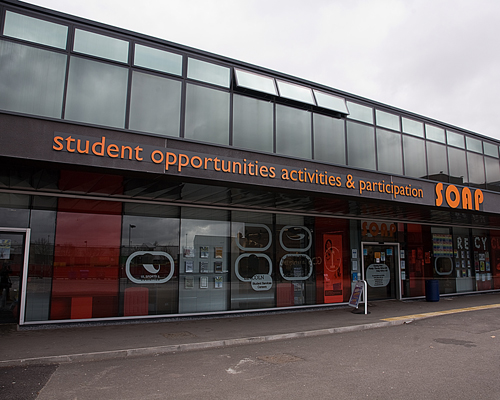As the end of this semester nears, societies’ attentions will turn to the submission of the Students’ Union’s Resource Assessment Packs (RAP packs), which help determine the amount of money each receives.
But some societies claim that the process disregards their needs and that budgets are ignored, with one person saying that “the Athletics Union (AU) have made our lives more difficult than the money we got from them was worth”.
 Adam Ramsey, the former president of the Canoe and Kayak Club, was not impressed when he picked up the allocated funds shortly after the start of the academic year.
Adam Ramsey, the former president of the Canoe and Kayak Club, was not impressed when he picked up the allocated funds shortly after the start of the academic year.
“I was gobsmacked, to be fair,” says Mr Ramsey. “We were given £1,000 and we applied for £5,000 in funding. A lot of our safety kit is on the verge of being out of date.”
He noted that “at the Freshers’ Fayre we had double the amount of people interested, and we went from 22 members to 52” placing an increased strain on the finances.
The situation was similar for the Christian Union (CU). Steve Ward, formerly the CU treasurer, said: “We opened the envelope to find £610” a figure that fell far short of the £4,651 requested.
“It is not as if we were just chucking random figures [at the SU], it was a carefully and sensibly calculated figure. It was obviously a shock and it kind of put our future plans back a few paces. We had to re-calculate everything.
“The president and I went through everything with a fine-toothed comb. We even accounted for times when we’d bring in money: ticket sales, clothing sales, things like that.”
Mr Ramsey and Mr Ward both noted that if societies do not spend their allocated funds they are punished for it. “We had no idea [this would happen]. We could have changed our plans accordingly. We’re very surprised we received so little,” said Mr Ward.
You should fill out the RAP pack “honestly and thoroughly, but don’t expect to get the amount you ask for”, he said.
Chris Farrell, the recently-elected Sports and Teams officer and Rowing Club president, has had a similar experience, saying that “I know how costly it can be to run a sport. We received £1,000 this year [but] most events cost [between] £600 and £800 to get to and be part of.”
The boats the team use cost £25,000 each, with Mr Farrell noting emphatically “basically it’s expensive”.
To finance their activities these societies made much use of self-raised funds.
Mr Ramsey says that they have raised about £2,000 from fees and activities, but that after transport and fees for affiliation to the Lincoln Canoe Club, “there is very little to play with”.
“Out of 20 boats we have five or six that are unusable. All of them were donated, most of the kit was donated.
“All of our paddles went missing over the summer. We couldn’t have done any trips without them,” he said. Even with a discount, the replacement paddles cost £250, paid out of the Club’s self-raised funds.
This, combined with excessive paperwork, he said, took 35 hours to fill in forms for the Club to participate in the annual “Tyne Tour” led Mr Ramsey to say that “the AU have made our lives much more difficult than the money we got from them was worth”.
He also dismissed the incoming Societies officer, Kayleigh Valentine, and her suggestion that societies should rely more on self-raised funds. “If they are not going to be supported by the SU what’s the point of them being there?
“For not much more [money] you can cut out the red tape” by cutting ties and setting up independently of the SU. “I hope that doesn’t have to happen.”
Mr Ward is more cheerful, saying: “We thought that it would be a pain [to raise funds], and it has taken a lot of extra thought but getting out there really makes you appreciate the money that you raise.”
He also mentioned the support the CU has received from local people and churches. “I’m not disagreeing that finances are a crucial part; it would have made the year a lot easier in terms of organising things, but we only lost out on three events out of a whole calendar this year. That’s a small fraction.
“We managed to survive, it wasn’t disastrous,” but at the same time, “we have learnt not to rely on financing.
“The SU have to realise that there’s often a lot of set costs that a society will have. For example…[for our] weekend away and events week we need to have a prior arranged set of money put aside so that we can plan them in the first place.
“The estimates we do make do need to be acknowledged to a certain degree.”
Maria Yesufu, the current Societies officer, responded to criticisms of the funding process by saying: “It is hard to please everyone.”
She hoped the new system of councils would help societies “take more ownership of the funding allocation”.

Why does the Christian Union need £4,561? I’m genuinely interested.
Make them work for their money.
This years rap pack has just been changed thanks to chris roberts. Ill be working along side him when the budgets become available to try and sort this mess out. However it is tio be noted that money is going to be tight this year. and fair budgets need to be allocated. my aim too. self raised will be also a big thing to look into next year again while we try and find new ways to gain funding.
This years RAP pack has just been changed thanks to Chris Roberts. I’ll be working along side him when the budgets become available to try and sort this mess out. However it is to be noted that money is going to be tight this year and fair budgets need to be allocated. My aim will be also be to look into new ways to gain funding next year.
Shane –
Mr Ward says that, due to their much increased membership, they wanted to hold many more activities and also raise the profile of the society. He says that last year they had just 10 or 11 regular members, and now number “easily 35 to 40”.
The SU has slowly closed down societys and worked against new societies over the past 2 years except certain ones that seen to have links to elected SU members… hmm… I wonder why?
Hmm… I’d like to know exactly what events they require the best part of £5k for though. Just think it’s a tad ambitious.
When the Law soicety pulled out of the AU it was for most of the reasons , amongst other things, outlined in The Linc article of late.
Along with this it was the “take it or leave it” attitude that concerned the members of whom present at an extraordinary meeting voted unanimously to leave.
There were a number of areas of serious concern for the Law Society and again one of them was the, funding versus what was expected. Onerous administritive excpectations along with the ever present threat threat of “fines” for non-compliance being just an example.
As for the level of funding a simple example of this is the recent Telders Competition that Law Students participated in the entry fee which was 1,000 Euros. plus hotels travel and basic subsistance. This is a prestigous International Law Mooting competition, that is simply one event! Not all course incurred expenses are in tangible “real” assets, such as equipment, thankfully the faculty paid for this but had they not, those students would not have been able to participate.
My personal view is that although, yes, all societies should self raise funds, agreed, but to be defensive and dismissive to the societies is another matter, the benefits of value for one society is different from one to the next, but lack of understanding or simply a rufusal to consider their view point is unhelpful.
It would seem that this has been rolling on for some months with a stance being taken.
If as appears to be so, so many are unhappy, why are those that have tried to participate in the process being dismissed in such away and there isues not being (or judging by the complaints) not appearing to be addressed positively, it would appear to be indicative of the “like it or lump it” attitude people seem to be unhappy with.
Obviously I can’t complain as I was involved in the withdrawal, but I do think that it is unfair on those who have tried to stick with the system and still appear disenfrancaised and let down.
@Fraser McFarland
You are asking: “the SU has slowly closed down societies and worked against new societies over the past 2 years, except certain ones that seen to have links to elected SU members… hmm… I wonder why?”
The SU doesn’t close down societies… if you can’t find 15 members then you never make it as a society to start with. Look how many new societies there are this year, all those have worked incredibly hard to get 15 members signed up, to raise funds and to really get off the ground, all with the hard work of Maria & the AU team. If you can’t get your members and the interest, then that isn’t the AU’s fault. Its not their job to do your job for you.